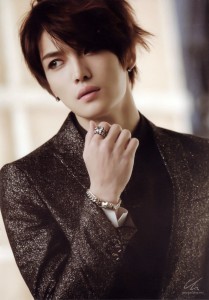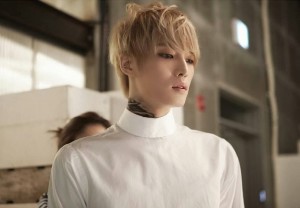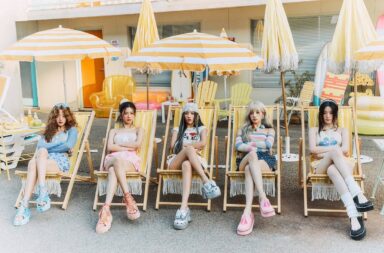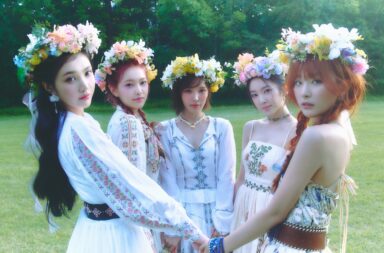 If you had asked me whether I thought Jaejoong was going to release a good first album a few weeks ago, I would have laughed and said my expectations were pretty much rock bottom. I/Y was incredibly disjointed, and while the individual songs were not bad, they left a bitter aftertaste of half-hearted ballad-rock mixed with visual-kei. It was clear that several songs were written for other purposes, and they ended up clashing against all the others when Jaejoong tried to put them into one album. Y especially caused problems because everything tacked on to the end of I was pure pop/ballad pieces; it threw off the stylistic balance of the album even further.
If you had asked me whether I thought Jaejoong was going to release a good first album a few weeks ago, I would have laughed and said my expectations were pretty much rock bottom. I/Y was incredibly disjointed, and while the individual songs were not bad, they left a bitter aftertaste of half-hearted ballad-rock mixed with visual-kei. It was clear that several songs were written for other purposes, and they ended up clashing against all the others when Jaejoong tried to put them into one album. Y especially caused problems because everything tacked on to the end of I was pure pop/ballad pieces; it threw off the stylistic balance of the album even further.
I think that a lot of what Jaejoong famously writes for himself, JYJ, and other groups tends to follow an unpolished path. Half of this can be attributed to Jaejoong’s raw, honest, composing style, a fourth to inexperience, and another fourth to an internal struggle to please all. It’s hard to cater to every single person on earth, and trying to do so will produce a product that is neither here nor there, and that just might be worse than either here or there. I honestly expected the same thing to happen to WWW.
However, it seems whenever you’re prepared for the worst, the worst never happens: WWW is a fabulous album. I’m not going to lie; I was floored when I first heard it. It’s thematically consistent, self-aware, and then some. What is rather striking about WWW is that it doesn’t try to be innovative or fall in love with itself the way I felt that I/Y had. I really felt that in WWW, Jaejoong capitalized on the versatility of the pop-rock genre (emphasis on the pop), yet infused enough of himself in it that the album is his in every way. Self-composition is not the be all end all of artistic merit, and I’m really happy that Jaejoong decided to step back a just a tad and open his musical work to a broader range of pop music. This way he was able to devote his energy into self-composing a few really good songs (“Rotten Love” for example) and developing album cohesion.
[youtube http://www.youtube.com/watch?v=bGCmPNPGkFo]WWW opens with “Brighter,” a song with the perfect momentum to start out the thirteen track album. “Brighter” is an incredibly fun song to say the least. It has all of the classic Japanese pop-rock elements: strong drums/guitar, sharp vocals, and a relentless, cut and dry melody. What I love most is how clean Jaejoong’s voice is and his control and firm enunciation even when he belts out notes. It’s so easy to feel the warmth and enthusiasm from “Brighter,” and it’s become my go-to anthem song when I need an emotional lift in my day.
“Don’t Walk Away” (feat. Junhyung) is the first of several collaborations on this album, though like almost all of these partnerships, the feature is rather forgettable. Despite this, ”Don’t Walk Away” really exemplifies the strongest points of the album—a focus on creating easily pleasing choruses and sticking to the tried and true melodic progressions. I would say that “Don’t Walk Away” is the most pop-derived track on the album, but it sits perfectly well among all the other tracks in the album because it pulls in the rock wherever it can.
Likewise, the two main tracks off the album, “Just Another Girl” and “Butterfly,” succeed in its full and earnest embrace of the pop-rock cliché. Sometimes, it’s better to just have a well written song with coalescence of timeless musical themes than something that claims to be different or revolutionary. Experimentalism certainly has its place, though I believe title tracks though need to emphasize the best, even at the expense of “creativity.” “Just Another Girl” does just that, and both reflects the personality of WWW and is an extremely solid song. In fact it’s rather hard to find anything to objectively critique about either “Just Another Girl” or “Butterfly” because everything is so tightly woven together. Leslie really nailed the emotional response to “Just Another Girl” and why it succeeds in her MV review, and I would have to add that from a technical standpoint both “Just Another Girl” and “Butterfly” are extremely appealing because they have seamless transitions between verses and chorus. Both songs are evenly layered from the base/drum line to the vocals.
 “Rotten Love” might be my favorite track on WWW. (It’s currently in competition between “9+1#” and “Brighter,” though I think I’ve changed my favorite song way too many times in the course of writing this.) I love the restraint and the broad use of Jaejoong’s silky lower register, on top of the song’s natural fluidity. When it comes to building the nuanced elements, I really like how the piano and guitar are somewhat out of phase with the song and meet back with vocal melody at the end of phrases—it sort of predicts the melody as we’re getting there. Variations on chorus provide the climatic development, and that process is supported by the instrumentation. The song is arguably simplistic from the listening standpoint, but “Rotten Love” is executed too well to care.
“Rotten Love” might be my favorite track on WWW. (It’s currently in competition between “9+1#” and “Brighter,” though I think I’ve changed my favorite song way too many times in the course of writing this.) I love the restraint and the broad use of Jaejoong’s silky lower register, on top of the song’s natural fluidity. When it comes to building the nuanced elements, I really like how the piano and guitar are somewhat out of phase with the song and meet back with vocal melody at the end of phrases—it sort of predicts the melody as we’re getting there. Variations on chorus provide the climatic development, and that process is supported by the instrumentation. The song is arguably simplistic from the listening standpoint, but “Rotten Love” is executed too well to care.
“Shiny Day” was another prerelease track, and I find that it provides much needed breathing room amidst a lot of similar sounding pop-rock tracks which make the first third of the album. The song is undoubtedly pretty, orchestra and all, and I really like the cadence of the chorus. Lee Sang-son’s feature though is pretty useless outside from the fact that it breaks up the repetitious element in the song by giving a change in vocal timbre. However, like most traditional Korean ballads, I haven’t taken a great liking to “Shiny Day.”
“Let The Rhythm Flow” is rather unexpected in WWW, because it doesn’t clamor to make a huge statement. It just sits there for you breathe in the relaxed atmosphere at whatever level you feel comfortable in. The melody comes in gentle waves and basically oscillates between two key notes in different octaves. Similarly, other minutiae in the song build to form a cohesive musical image of the title, “Let The Rhythm Flow.”
“I Said I’m Sorry” clearly was composed with the intention of featuring voice, but surprisingly, it is very different from Jaejoong’s other self-composed tracks of similar purpose. It still has Jaejoong’s vocal theatrics, but for some reason, the annoyance factor is toned down tremendously by the deserted and delicate instrumental. The piano and Jaejoong’s voice essentially have a duet, which works really well with the smoothness of natural timbre. The complementary effect is beautiful, and I would prefer it to “Sunny Day” any time if not for the few moments where Jaejoong “tries a little too hard.”
 When I first listened to “Now Is Good,” I felt like the song didn’t fit Jaejoong at all. I actually really like the composition of the song, but I don’t think it was meant for Jaejoong at all. I can’t exactly put my finger on why I carry this sentiment, but I think it has to do with Jaejoong’s voice lacking the right kind of richness. It’s too thin for this. In any case, “Now Is Good” is the mellow second coming of “Let The Rhythm Flow.” “Now Is Good” is a relaxing listen despite everything I said about Jaejoong’s incompatibility with it. I love how comforting the orchestra, the guitar and the piano become when incorporated in just the right ratios. “Now Is Good” also progresses its musical idea exceptionally until the last thirty seconds, where I felt the ending came with little sense of conclusion. Nevertheless, with “Just Another Girl,” and “Brighter,” it is one of best composed numbers in the album.
When I first listened to “Now Is Good,” I felt like the song didn’t fit Jaejoong at all. I actually really like the composition of the song, but I don’t think it was meant for Jaejoong at all. I can’t exactly put my finger on why I carry this sentiment, but I think it has to do with Jaejoong’s voice lacking the right kind of richness. It’s too thin for this. In any case, “Now Is Good” is the mellow second coming of “Let The Rhythm Flow.” “Now Is Good” is a relaxing listen despite everything I said about Jaejoong’s incompatibility with it. I love how comforting the orchestra, the guitar and the piano become when incorporated in just the right ratios. “Now Is Good” also progresses its musical idea exceptionally until the last thirty seconds, where I felt the ending came with little sense of conclusion. Nevertheless, with “Just Another Girl,” and “Brighter,” it is one of best composed numbers in the album.
Nothing screams the end of a peaceful interlude like a punk-rock inspired piece. I honestly didn’t think that Jaejoong had it in him to compose something so aggressive and clean, yet here we have “9+1#.” With “Brighter,” “Rotten Love,” and now “9+1#,” I’m totally on board with Jaejoong self-composing again. I had lost faith when In Heaven came out, and that was only reinforced by I/Y’s half-baked quality. Honestly, whatever Jaejoong has been doing in the songwriting department since January has to stay. It’s wonderful, and I love how he’s able to keep things very ear friendly with a sharp and catchy chorus. The grunge that comes out in “9+1#” helps stabilize the ear-worm melody and provide grounding. This is probably the one track I would really love to see performed live.
“Luvholic” is a really catchy and fun song, though I wish Ha Dong Qn was not the person he chose to partner with. Ha Dong Qn has a very heavy voice and it competes way too much Jaejoong’s thinner one. What Luvholic needed was to create two vocal textures; a gritty timbre to complement Jaejoong’s smooth one. I personally think that a lot of the song is also white noise, which puts me on the fence with “Luvholic.” On one hand, the song really caters to “letting go,” and on the other hand we have a song that goes nowhere.
Taking the same vein as “Luvholic” tonally, “Modern Beat” is cheerful and directional. I love the parallel voices in the chorus and how it just cuts to the chase to the main melody. It adds the right amount of punch and gives the ear multiple lines to follow simultaneously: the guitar, the complementary vocals, and the main vocals. It arguably has the same shortcomings that a lot of the songs in WWW have, oversimplification; however, the strong association of all the song’s core elements lends itself to becoming an extremely strong track.
 “Paradise” is a rather unfortunate track to end on, because it’s easy to see what it wanted to become: the experimental, grand statement, to tie up the album. That being said, “Paradise” is like baking a cheesecake and ending up with a crack down the middle as you pull it out, or realizing your soufflé deflated after taking painstaking care in building it. The instrumentation is all there in “Paradise”: the cadence is great, and all the trippy moments are wonderful to latch your ear onto. Piano is juxtaposed with the distorted undertones; glissandos go ever so slightly out of tune along with the instrumentation at the beginning of phrases. Where it falters however, is that the whole song boils down to a single unit drawn out and repeated twice in a linear fashion. The song ends and all you can think is, “that’s it?” Adding that I’m not a huge fan of the sound of the lyrics (how words are put together) and the vocals themselves, “Paradise” really becomes an incomplete thought. It’s a shame that this is the ending note to such a strong album.
“Paradise” is a rather unfortunate track to end on, because it’s easy to see what it wanted to become: the experimental, grand statement, to tie up the album. That being said, “Paradise” is like baking a cheesecake and ending up with a crack down the middle as you pull it out, or realizing your soufflé deflated after taking painstaking care in building it. The instrumentation is all there in “Paradise”: the cadence is great, and all the trippy moments are wonderful to latch your ear onto. Piano is juxtaposed with the distorted undertones; glissandos go ever so slightly out of tune along with the instrumentation at the beginning of phrases. Where it falters however, is that the whole song boils down to a single unit drawn out and repeated twice in a linear fashion. The song ends and all you can think is, “that’s it?” Adding that I’m not a huge fan of the sound of the lyrics (how words are put together) and the vocals themselves, “Paradise” really becomes an incomplete thought. It’s a shame that this is the ending note to such a strong album.
All things considered, WWW is one heck of a way to jump out of the gate. Jaejoong takes the best of simplicity and ties it into one neat package; the most appealing elements and theory of pop music are cast under the fold of rock music. In that respect, WWW is not a hard album to fall in love with, because it is, in essence, really great pop music. It casts a balance between music that orbits around a finely crafted chorus and music that has cohesion and depth as a complete musical idea. This divide is both a blessing and a curse for WWW, because it does have a tendency to tread the waters of banality. Songs fold into each other really well, and the unintended consequence is that by the end you may forget what one song sound like in relation to another. Like I mentioned before, Jaejoong’s songs (and a few others) have the quality of being all chorus, which contributes heavily to that stagnation in sound. As a burgeoning artist, learning to create depth in a piece apart from the chorus music may be the next step in development, though we can see that finesse quickly growing in all of the work Jaejoong has done for this album. With WWW, I’m happy to say that I’m once again am excited to see with what he comes up with next. Hopefully it is as confident and tightly woven as this one.
Score: An easy 4.5/5, though I do admit the catchy pop-rock makes me biased.
(CJES Entertainment, Youtube)


